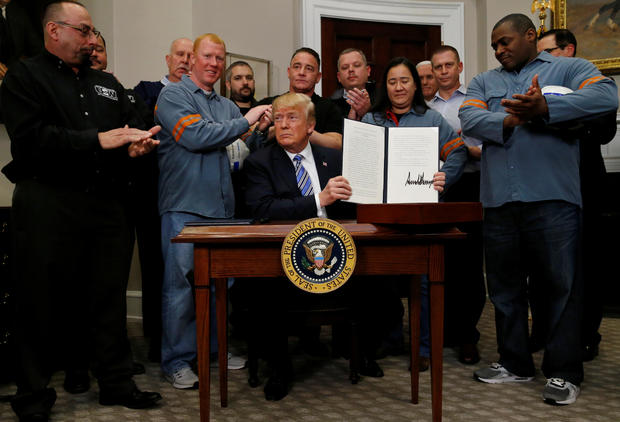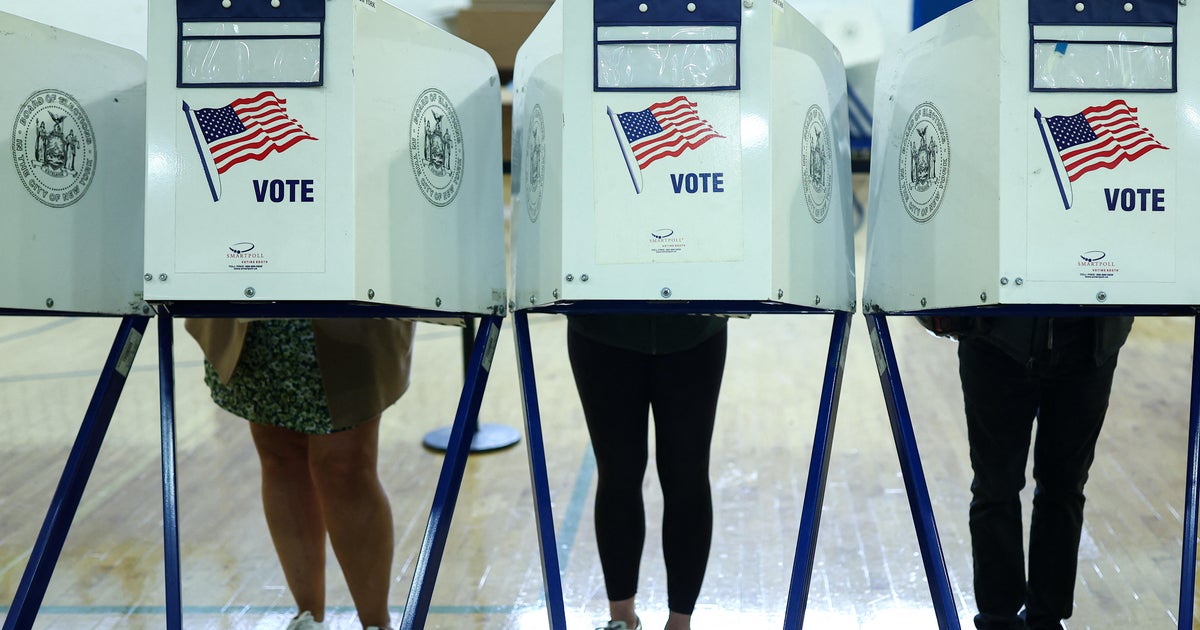Lawmakers react to Trump steel and aluminum tariff announcement
In the face of opposition from both Democrats and Republicans, President Trump signed tariffs on steel and aluminum from every country except Mexico and Canada, declaring a 25-percent tax on steel imports and a 10-percent tax on aluminum imports.
"It's really an assault on our country," Mr. Trump said. "It's been an assault."
Members of Mr. Trump's own party have largely been kept in the dark by the White House on the matter. In fact, even as late as Thursday afternoon, trade staffers in key congressional offices still had not been briefed on the White House tariff plan. Mr. Trump announced the tariffs at 3:30 p.m. ET.
A few congressional GOP members have attempted to change the president's mind on the tariffs, including Sen. Orrin Hatch, R-Utah, who chairs the Senate Finance Committee.
"I think there's a good chance that we will nullify them at least if I have my way because I just don't see it personally," Hatch said. "I think most Republicans are not going to put up with this and I personally believe we may be able to stop it in the Congress," he later added.
Many lawmakers have openly denounced Mr. Trump's decision. Others hope they can at least get him to reconsider or modify the legislation if other countries react poorly.
House Ways and Means Chairman Kevin Brady, R-Texas, who has been the GOP's point person on this issue in the House, unsuccessfully attempted to formulate an alternative plan Mr. Trump could support.
Sen. Jeff Flake, R-Arizona, who is not planning to seek re-election, announced Thursday that he will "immediately" draft legislation that attempts to block the tariffs.
"These so-called 'flexible tariffs' are a marriage of two lethal poisons to economic growth – protectionism and uncertainty," Flake said in a statement. "Trade wars are not won, they are only lost. Congress cannot be complicit as the administration courts economic disaster."
However, any potential legislation to counter the tariffs would have to have enough votes to overcome a potential presidential veto. With this in mind, any Republicans would likely be reluctant to vote against the president, along with several rust-belt Democrats who support the tariffs.
"I'm encouraged, I really am and I think it gives us a chance to basically reboot, get jobs back to West Virginia, back to America," said Sen. Joe Manchin, D-West Virginia. "I'm excited about that."
Canada and Mexico are temporarily exempt from the tariffs, although their future is uncertain, and lawmakers are still concerned about how other major U.S. allies will react.
Senate Democratic Whip Dick Durbin, D-Illinois, called the move "an all-out trade war" on U.S. allies.
"The sweeping tariffs announced today are like dropping a bomb on a flea," he said in a statement.
House Speaker Paul Ryan said it was "absolutely prudent and wise to exempt our allies in North America," referring to Canada and Mexico, but said that he hopes to work with the Trump administration on the matter.
"We want to limit as much unintended consequences and collateral economic damage as possible and we want to work with the administration to do that," he said moments before the president's announcement on tariffs at an employee town hall and press conference at Home Depot store support center in Atlanta.
In terms of other congressional GOP leadership, Senate Majority Leader Mitch McConnell said that he's "concerned about the scope of the proposed tariffs."
"I am pleased to see that the administration today made accommodations for some of our trading partners and allies," McConnell said in a statement. "However, important questions remain about whether ultimately these tariffs will be sufficiently targeted, tailored and limited."
Meanwhile, although House Minority Leader Nancy Pelosi agreed with the intent of Mr. Trump's initiative, she disagreed with the way it was introduced.
"We must be strong and smart in fighting back against trade cheaters' assault on American workers – in a targeted and strategic manner," she said in a statement. "It is distressing to see President Trump's chaotic roll-out needlessly maximizing the collateral damage to American workers, consumers and our international alliances. Antagonizing our allies and practically inviting retaliation on American manufacturing was completely unnecessary."
Sen. Ted Cruz, R-Texas, commented that "we've already seen the Europeans threaten tariffs" against American products like blue jeans, Harley Davidsons and bourbon.
"You know we're seeing the economy booming right now as a result of tax cuts and regulatory reform," Cruz said. "And I sure hope we don't undo a lot of the good we've done in the past year by, by imposing tariffs that threaten those very jobs that have been growing and expanding."
On the other hand, Sen. John Kennedy, R-Louisiana, believes that the tariffs may even out the international playing field.
"I don't want to start a trade war," Kennedy said. "I don't want to see our friends punished along with our enemies. I think that those who cheat, we need to call their hand. If we're cheating, other countries ought to call our hand. That's why they call it 'free and fair trade,' but I don't want to -- in an effort to try to help our steel workers, who are very important to us."
CBS News' chief congressional correspondent Nancy Cordes and Alan He contributed to this report.




